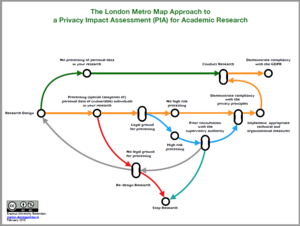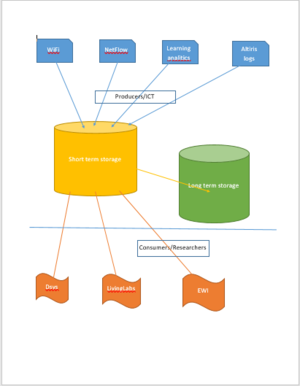Legal Issues on TU Delft being a research object
If the statement in the strategic framework of the TU Delft about the university being a research object is taken seriously, a communication plan and campaign should be created to make this clear. As an example at the WUR the customers of their canteen are research subjects.,without given informed consent by the individual and without an opt-out.
For the workshop we also invited (next to the researchers) two of the data stewards (msc. Jasper van Dijck and Madeleine de Smaele), the FG (‘Functionaris Gegevensbescherming’) of the TU Delft (mr. Erik van Leeuwen), the ICT Security Manager (Marco de Graaf) and the secretary of the HREC (ir. Joost Groot Kormelink). And at the end the chair of the HREC joined (prof. dr. Sabine Roeser). In total there were around 20 people.
An introductory presentation and discussion on the GDPR (AVG) was given by drs. Marlon Domingus from Erasmus University. He gave a thorough insight into how and where the GDPR (General Data Protection Regulation) comes into play. Although a (D)PIA (Privacy Impact Assessment) is not always necessary, it is a handy tool to get the discussion on track. Marlon presented a flowchart of a research project using (privacy) data. The flowchart was immediately applied to one of the WiFi data use cases during the discussion.

Some of the key points:
- Finding a balance between the legitimate interest of the researcher and the privacy right of the individual.
- Understanding what the legal ground is for collecting or further processing. Research itself can be a legal ground for collecting or processing privacy data.
In the second part of the session I presented a global view of a data platform for the researchers. This platform combines different data resources into one storage system, which can be queried by the different researchers. The technical implementation is not the problem.

In the session it was clear that the production side and storage part should comply to the GDPR. The production side is a further processing of already gathered data. The legal ground for this processing must be stated. This GDPR compliancy must be created by Department ICT&FM. Each researcher must then clearly define the purpose for which they are going to use the data and be GDPR compliant. Good user management is essential to control who can collect what data from the platform. The researcher must only be allowed to collect the data they need for their particular research question.
Of course ethics also play a part in this. The university is working on a new integrity policy. A taskforce will possibly be created to deal with the changes coming from the changing legislation. The researchers in the session would like to see a flowchart for the ethics, similar to the flowchart for the legal aspects.
Acknowledgements
Thank you to colleague Julie Beardsell for turning the blog inside-out and to her and colleague Susan Branchett for correcting my English.